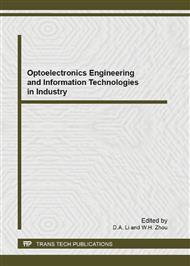p.2146
p.2151
p.2156
p.2162
p.2167
p.2172
p.2177
p.2183
p.2188
An Evaluation Model to Human Factors in Information Systems Based on Consistent Quantification of Index and Evaluation Equilibrating
Abstract:
In this paper, a comprehensive evaluation model to human factors is presented for information systems. The model can be used in the evaluation that the number of evaluation expert for every evaluated object or target is different. By introducing the concept of Gini coefficients, the coordinated and balance degree of evaluated targets can also be reflected in the evaluation. The proposed model can be widely used because it contains the process of different types of index such as quantitative, qualitative, cost and benefit targets. The reliability and universality are validated by experiment results.
Info:
Periodical:
Pages:
2167-2171
Citation:
Online since:
September 2013
Authors:
Keywords:
Price:
Сopyright:
© 2013 Trans Tech Publications Ltd. All Rights Reserved
Share:
Citation:


